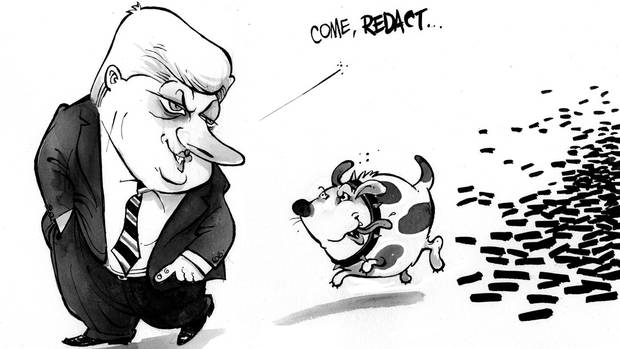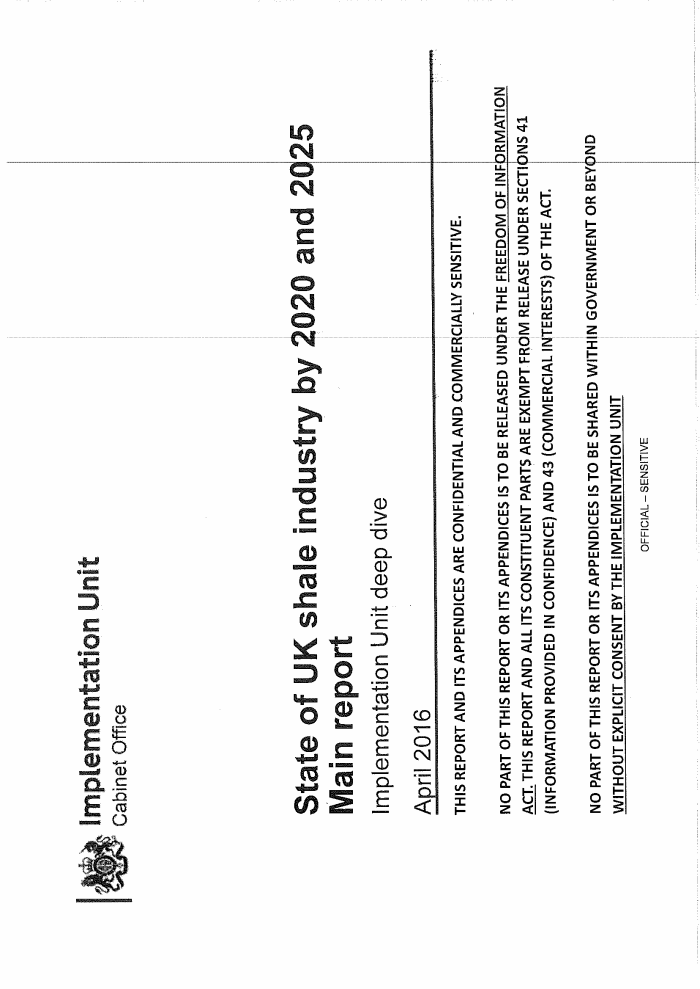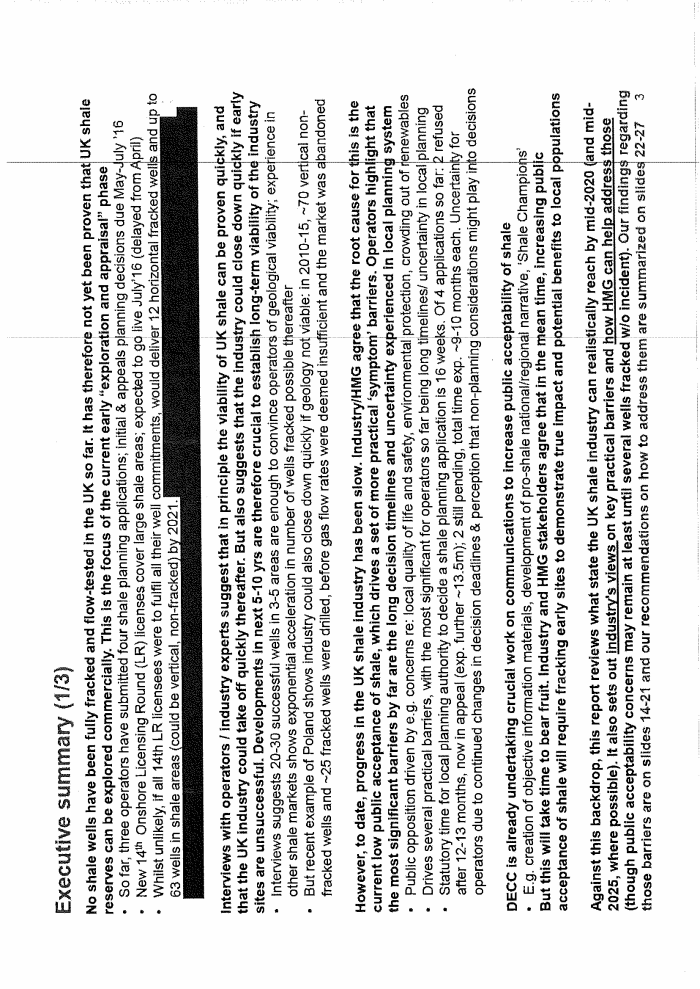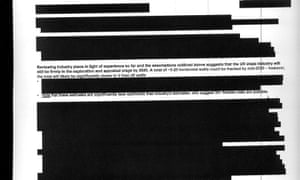“People will be wondering why there’s so little the government is willing to reveal about fracking and so much it wants to hide.”
Fracking report: Government heavily redacts document revealing tactics for convincing public to accept shale gas, ‘The fact they have tried to cover this up by redacting pages of critical information – like with their talks with the US over selling off parts of our [National Health Service] – further illustrates this government’s contempt for the public’ by Andy Gregory, Dec 3, 2019, The Independent
The government has “heavily censored” a secret report on the fracking industry, released by court order after years of trying to keep it hidden from the public.
Whitehall initially refused to reveal the 2016 report when it came to light in January 2018 because “it could call into question the industry’s viability”, kick-starting a 22-month freedom of information (FoI) battle with Greenpeace.
After ignoring an information tribunal’s order in October to release the documents, the Cabinet Office finally complied on Monday – with 37 of the report’s 48 pages completely redacted behind a “black wall” of ink.
The uncensored passages that remain reveal the government had identified public opposition to fracking as the industry’s main barrier to progress, and decided to develop a ”pro-shale narrative”, with plans to incorporate energy companies’ own messaging into the government’s “longer-term national communications efforts”.
It also showed that in response to operators’ concerns, Whitehall was deliberating over ways in which planning and public consultation processes could be made faster and “more predictable”.
Suggestions included “reducing resources [for local authorities] invested to request additional information from industry” and seeking advice on whether they can “time-out” legally required consultees who are late in submitting input.
Shadow cabinet office minister Jon Trickett said: “This report clearly shows that the Tories have bent over backwards to serve the interests of big business, especially the oil and gas industry.
“The Conservatives have taken money from oil executives, trashed the rights of communities and enabled fracking companies to threaten their local environment.
“The fact they have tried to cover this up by redacting pages of critical information – like with their talks with the US over selling off parts of our NHS – further illustrates this government’s contempt for the public.”
Read more
- Cuadrilla vows fightback to overturn government’s fracking moratorium
- Ministers face mounting pressure to permanently ban fracking
- Why fracking has finally fracked off
In October, the government issued a moratorium on fracking after the UK’s only site, Cuadrilla’s Preston New Road well in Lancashire, was blamed for a series of earthquakes.
But campaigners are worried the temporary ban may be lifted again if the Tories win the forthcoming election, with Jeremy Corbyn branding it an “election stunt”.
Business secretary Andrea Leadsom admitted the failure was a “disappointment” and still contended shale gas remained something the UK “will need for the next several decades”. She said the ban would remain in effect until “new compelling evidence is provided”.
“It’s clear that previous Conservative administrations bent over backwards to help the fracking industry bulldoze its way into the British countryside,” said Greenpeace’s head of politics Rebecca Newsom.
“People would feel much more confident about the Conservatives’ pledge on fracking if they used the overwhelming evidence of its unacceptable risks to people and our environment to introduce a permanent ban, and put this industry to bed once and for all.”
The redacted report was obtained by Unearthed, Greenpeace’s investigations team. Last year, it received a small portion of the report via FoI request which showed officials were privately sceptical of the forecasted scale of fracking’s success.
The newly released passages show how far the Cabinet Office was willing to go to make the industry a success.
It appears that rather than addressing public concerns about “local quality of life and safety, environmental protection [and the] crowding out of renewables”, the now defunct Department for Energy and Climate Change was “already undertaking crucial work on communications to increase public acceptability of shale” such as the “development of pro-shale national/regional narrative” and “shale champions”.
Another passage suggests that despite a lack of evidence for the safety of hydraulic fracturing, officials were concerning themselves with how to minimise planning regulations to alleviate the concerns of businesses.
The passage reads: “Current and future operators stress that they will only bring forward large sites if current long planning times and perceived uncertainty is reduced – ie unless this can be resolved, UK shale will not take off even if geology proven.”
Despite fracking being responsible for releasing vast amounts of methane – a key greenhouse gas – the government has long maintained that fracking can help the UK transition away carbon and reduce reliance on imports.
Watch more
Ms Newsom added: “Looking at this black wall of redacted pages, people will be wondering why there’s so little the government is willing to reveal about fracking and so much it wants to hide.
“If ministers have really dropped their support for this polluting industry, why not publish this report in full and come clean about what’s been going on behind closed doors for years?”
Ken Cronin, chief executive of trade group UK Onshore Oil and Gas, said the report reveals “no new information of interest”.
He said: “It is true that shale gas development in the UK has progressed at a steady pace, although this is commensurate with the exploratory and highly regulated nature of the industry.
“Since this report was [produced], the first hydraulic fracturing since 2011 has taken place, several sites have been constructed and tested across North Nottinghamshire and multiple planning applications have been submitted for further exploratory work across Derbyshire and Lancashire.
“As with any industry that involves development, our progress has been slowed by the local planning system. This is not a unique problem to shale within the energy sector. Onshore wind and solar have met with comparable delays where applications have been filed.”
The Conservative Party did not respond to a request for comment.
The report, which has been redacted on every page except the cover, can be viewed online.
‘Black wall’ of redacted pages as fracking report finally released, People will wonder why there is so much the government wants to conceal, says Greenpeace by Jillian Ambrose, 2 Dec 2019, The Guardian
The government has heavily redacted a secret report into the fracking industry after it was forced to comply with a court order for its release.
The Whitehall report on the UK shale gas sector emerged on Monday after a years-long battle to uncover the hidden documents – but with three quarters of its pages blacked out. The 48-page report, seen by the Guardian, includes 37 pages that are entirely blacked out and only one – the front cover – that was left uncensored.
The remaining paragraphs outline plans to help frackers by countering the public’s rising public opposition to the industry with a government-led campaign to develop a “pro-shale narrative”.
The report, written in 2016, was finally released after an information tribunal ruled that it would be in the public interest to disclose its findings. Greenpeace has fought a long legal battle with the government over the suppression of the document.
Rebecca Newsom, Greenpeace UK’s head of politics, said: “Looking at this black wall of redacted pages, people will be wondering why there’s so little the government is willing to reveal about fracking and so much it wants to hide.
“If ministers have really dropped their support for this polluting industry, why not publish this report in full and come clean about what’s been going on behind closed doors for years?”
The report’s unredacted paragraphs said that the government was “already undertaking crucial work on communications to increase public acceptability of shale” and promised further government help to develop a “pro-shale national/regional narrative” and “shale champions”.
Greenpeace said the Conservative government should ban fracking permanently after it called an immediate halt to drilling in England this month. The government said it would not agree to any future fracking “until compelling new evidence is provided” that proves fracking could be safe, amid concerns over ground tremors caused by drilling.
“People would feel much more confident about the Conservatives’ pledge on fracking if they used the overwhelming evidence of its unacceptable risks to people and our environment to introduce a permanent ban, and put this industry to bed once and for all,” Newsom said.
Fracking, also known as hydraulic fracturing, involves pumping water, chemicals and sand underground at high pressure to fracture shale rock and release trapped oil and gas. Environmental campaigners argue that fracking should be banned because it increases carbon dioxide emissions and causes air and water pollution, alongside ground tremors.
Jon Trickett, the shadow minister for the Cabinet Office, said the Conservative party has “bent over backwards to serve the interests of big business, especially the oil and gas industry” while ignoring the voices of local people.
The report was released to Unearthed, the investigations arm of Greenpeace, after a lengthy battle between the campaigners and the Cabinet Office.
Greenpeace uncovered some of the report’s findings last year through a Freedom of Information (FoI) request but the campaigners were barred by Cabinet Office officials from obtaining the full report.
The FoI found that the shale gas industry was unlikely to achieve the exaggerated economic benefits promised by its proponents due to strong local opposition to fracking, with only 4% of the UK’s potential shale projects likely to go ahead in the face of strong opposition.
Ken Cronin of UK Onshore Oil and Gas said the case for UK shale gas development “is stronger than ever” because the UK is relying more heavily on gas from Qatar and Russia.
“This report plainly shows that there is still a lot of work left for us to do, which is what our members will be focusing on in the coming months,” he said.
The government’s own data revealed last month that public opposition to shale gas fracking has climbed to record highs while support for the shale industry has slumped to the lowest levels since records began six years ago.
The Cabinet Office declined to comment.
****
In Canada too!

Then Canada’s Prime Minister Steve Harper with his dog, Redact.
And, in Alberta, specifically to cover-up frac’ing contaminating drinking water and causing water wells to run dry:
2016 04 01: It took Ernst 4 years of expensive, time-destroying battle to get uncensored “public” records from Alberta Environment and the Alberta Research Council (now Alberta Innovates) on frac’ing-caused water contamination cases under Freedom of Information legislation. The records were eventually ordered released by OIP Commissioner’s Office after a year and half in official inquiry. As of Dec 3, 2019, the public baseline water well testing data remains completely withheld by Alberta Environment even though it was ordered released to Ernst. Rule of Law means nothing when it comes to oil and gas industry causing harm to Canadians.
With a December 19, 2014 deadline, Alberta Court of Queen’s Bench ordered Encana to release to Ernst all records relevant to her lawsuit. Alberta Rules of Court do not allow trade secrets as a reason to withhold records. As of today, five years later, Encana continues to withhold from Ernst all chemicals the company injected directly into the fresh water zones around the Rosebud community, and Ernst’s water well, as well as many other vital relevant records relating to her lawsuit.
****
Country Life Today: Government ‘release fracking report with 37 of 48 pages entirely blacked out by censor’s pen’ by Toby Keel, Dec 3, 2019, countrylife.co.uk
The startling censorship of a fracking report….
Breathtaking government censorship of a report into fracking
A 48-page government report into fracking has been released after Greenpeace finally won a lengthy legal battle arguing that it is in the public interest to publish the document.
What has actually been released, however, is more reminiscent of 1980s East Germany rather than 2010s Britain. The vast majority of the document has been redacted, according to The Guardian; 37 of the 48 pages have been blacked out completely, and only one has been left uncensored: the front cover.
Fracking is a great worry and a hugely important issue, particularly to people living in the country; releasing a report in this pitiful state will surely only serve to exacerbate rather than calm people’s misgivings.
Rebecca Newsom, Greenpeace UK’s head of politics, told The Guardian: ‘Looking at this black wall of redacted pages, people will be wondering why there’s so little the government is willing to reveal about fracking and so much it wants to hide.’
Government finally releases secret fracking report by Zack Boren, Dec 2, 2019, unearthed
The still-censored document reveals details of huge Whitehall effort to support development of shale gas industry in the UK
The Cabinet Office has finally released its – still heavily redacted – secret report on the fracking industry, following a 22-month Freedom of Information battle with Unearthed.
The document – produced by the Cabinet Office in 2016 but never published – confirms government and industry players were privately downbeat about the prospects for a UK shale boom, even as they talked up the sector’s potential.
Unearthed first discovered the existence of the report in early 2018, but its information request was rejected because the government claimed it “could call into question the industry’s viability.”
Following a hearing in July this year, the information tribunal ordered the government to release key extracts of the report. The government failed to comply with the order to publish on 25 November, but finally released the report late on Friday afternoon.
Though sections of the document have been unredacted, it remains heavily censored.
Jon Trickett, shadow minister for the Cabinet Office, told Unearthed: “This report clearly shows that the Tories have bent over backwards to serve the interests of big business, especially the oil and gas industry.
“The Conservatives have taken money from oil executives, trashed the rights of communities and enabled fracking companies to threaten their local environment.
“The fact they have tried to cover this up by redacting pages of critical information – like with their talks with the US over selling off parts of our NHS – further illustrates this Government’s contempt for the public.”
He added that a Labour government would ban fracking, expand the Freedom of Information act, and “introduce tough new transparency rules”.
The Conservative Party failed to respond to requests for comment.DOCUMENTPAGESTEXTZoom



«Page 1 of 48»
Ken Cronin, chief executive of trade group UK Onshore Oil and Gas, said: “This 2016 report reveals no new information of interest. It is true that shale gas development in the UK has progressed at a steady pace, although this is commensurate with the exploratory and highly regulated nature of the industry.
“Since this report was [produced], the first hydraulic fracturing since 2011 has taken place, several sites have been constructed and tested across North Nottinghamshire and multiple planning applications have been submitted for further exploratory work across Derbyshire and Lancashire.
“As with any industry that involves development, our progress has been slowed by the local planning system. This is not a unique problem to shale within the energy sector. Onshore wind and solar have met with comparable delays where applications have been filed.”
The report’s release comes as the government has placed a pause on fracking, though activists fear the moratorium could be lifted by a Conservative government after the election.
Business Secretary Andrea Leadsom said the moratorium would remain in effect until “new compelling evidence is provided” regarding the serious seismic incidents drilling has triggered in the north of England.
The Department for Business, Energy and Industrial Strategy was unable to comment due to pre-election ‘purdah’.
‘Pro-shale narratives’
The Cabinet Office’s report, which is based on interviews with 28 industry stakeholders, identifies “low public acceptance of shale” as the primary barrier to the industry’s progress.
This is described in the report as “public opposition driven by concerns re: local quality of life and safety, environmental protection, crowding out of renewables.”
Rather than address these concerns, however, the officials appeared to regard them as a communications problem.
The report notes that the now-defunct Department for Energy and Climate Change (DECC) was “already undertaking crucial work on communications to increase public acceptability of shale” such as the “development of pro-shale national/regional narrative” and “shale champions.”
Messages from companies were even fed into the government’s “longer term national communications efforts”.
This public opposition, the report claims, led to “a set of more practical ‘symptom’ barriers” that the Cabinet Office deliberated on how to lift.
Industry lobbying
It said: “Operators highlight that the most significant barriers by far are the long decision timelines and uncertainty experienced in local planning system.”
“Current and future operators stress that they will only bring forward large sites if current long planning times and perceived uncertainty is reduced – ie unless this can be resolved, UK shale will not take off even if geology proven.”
In response, the report discusses a range of possible measures to smooth and speed-up the permitting process for would-be frackers, including:
- improving “incentives to process application[s] in [the] 16 week statutory timeframe”.
- possibly “moving shale from local planning into national planning regime”
- reviewing “scope for accelerating planned DECC work on developing options for the settlement of shale long-term liabilities, to prevent this becoming a potential source of further delays in the local planning system in the future”
- pressuring independent regulator the Environment Agency to speed up permitting process “without increasing risk of judicial review.”
- exploring ways to make public consultations and the planning process “more predictable,” including receiving advice on whether they can “time out” statutory consultees who are late in submitting input and even “reducing resources [for local authorities] invested to request additional information from industry.”
Questions over viability
Unearthed’s discovery of the report nearly 2 years ago related to government’s internal projections for the the growth of UK fracking, which turned out to be far more conservative than the vast number of wells and wealth the industry had predicted.
There is much in the Cabinet Office’s report that indicates government and industry players understood these growth forecasts could well be overblown, and the long-term viability of UK fracking remained unproven.
“The development of the UK shale industry over the next 5-10 years is subject to great uncertainty – most importantly because the viability of the UK shale reserves is not yet proven,” the report states.
It goes on to reference interviews with operators and industry experts that “suggest that the industry could close down quickly if early sites are unsuccessful. Developments in the next 5-10 years are therefore crucial to establish long-term viability of the industry.”
The extent of the detail provided in the report is that government expected 5-10 horizontal wells could by fracking by 2020, “with a realistic expectation being significantly closer to 5 than 20.”
With less than a month to go before 2020, we now know that even the government’s “realistic expectation” was excessively optimistic. There are currently no fracking sites producing gas in the UK, and the government has announced that it will not support future projects.
A far cry from the 4,000 wells by 2032 forecast in 2014, which still underpins industry projections 6 years later.
Redactions remain
The revelations scattered through the report, however, should not distract from the fact that the Cabinet Office’s report remains heavily redacted.
37 of the 48 pages are fully censored and many of the others contain significant redactions.
The ‘background’ page is effectively free to read and so to are major extracts of the executive summary, and the occasional line from the report’s body.

